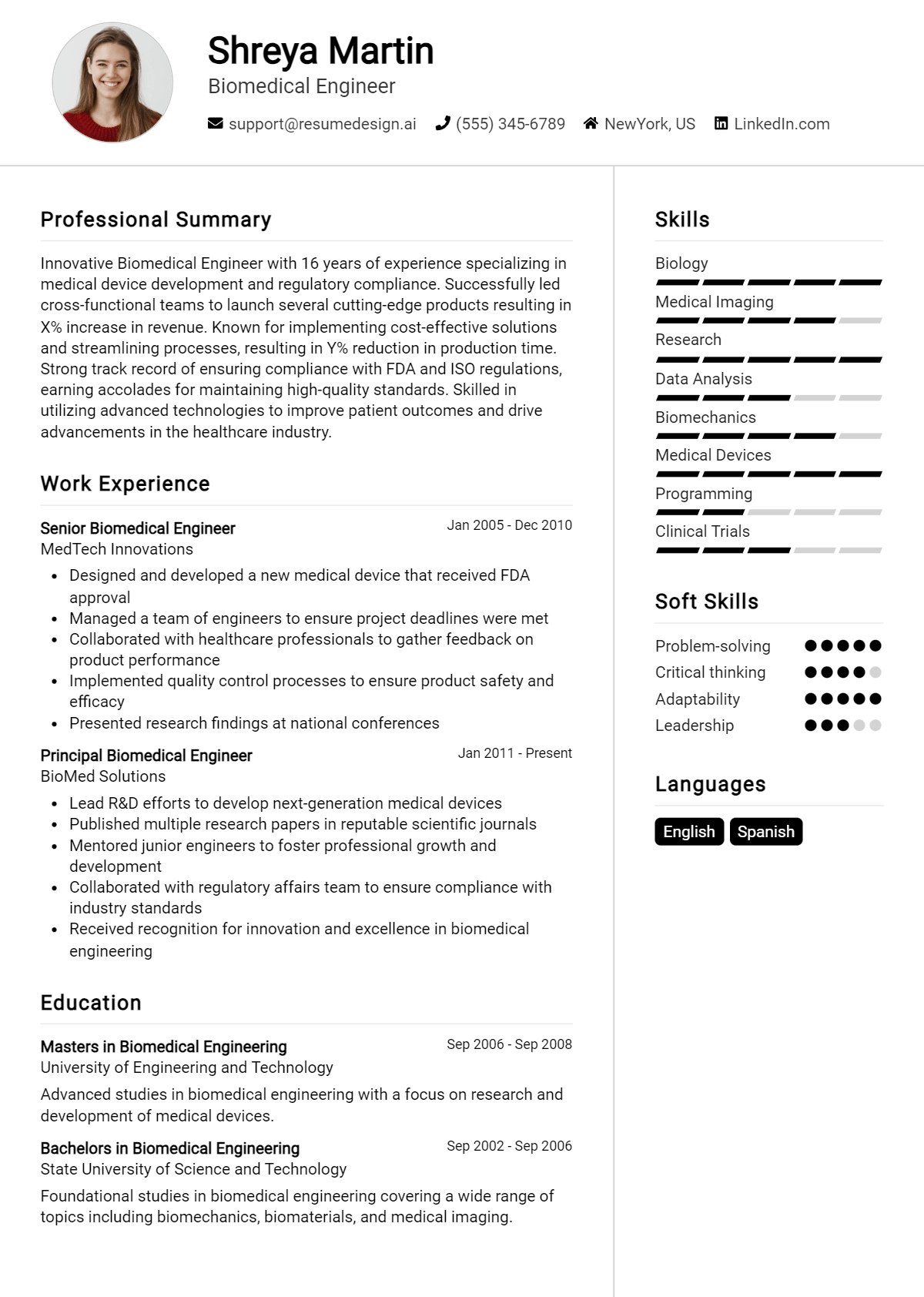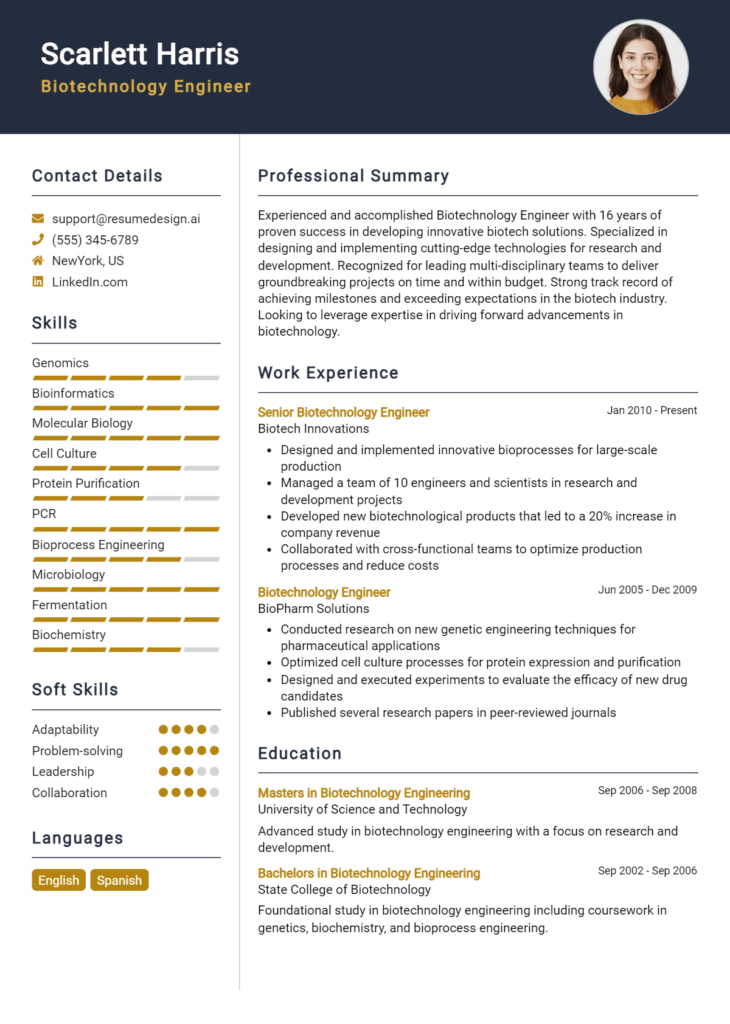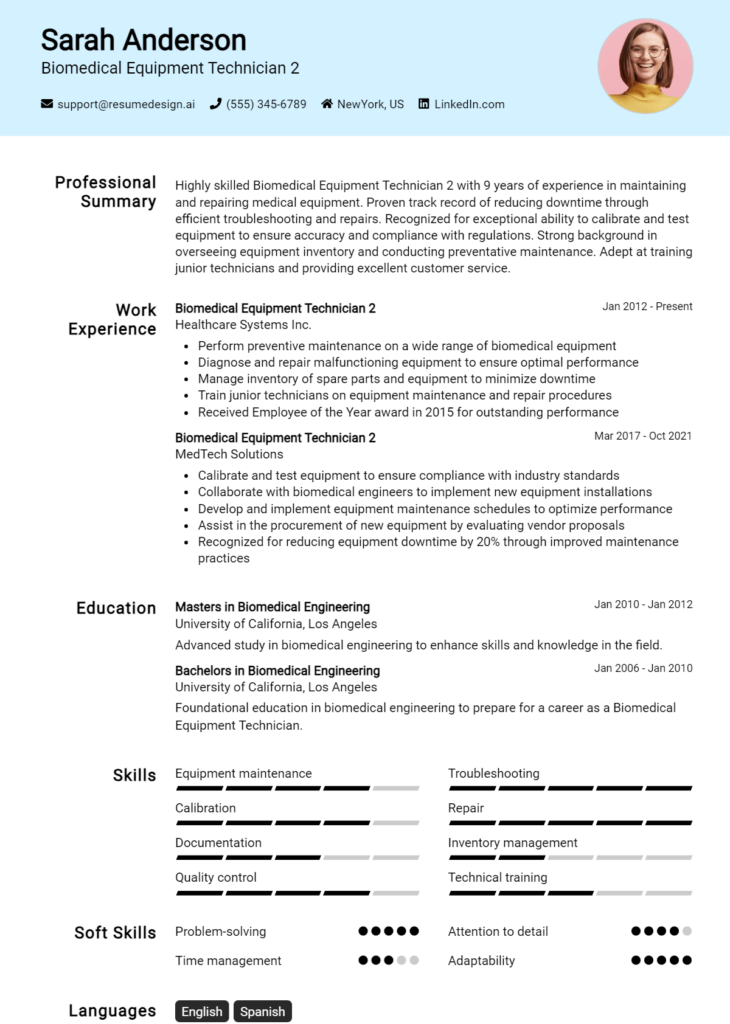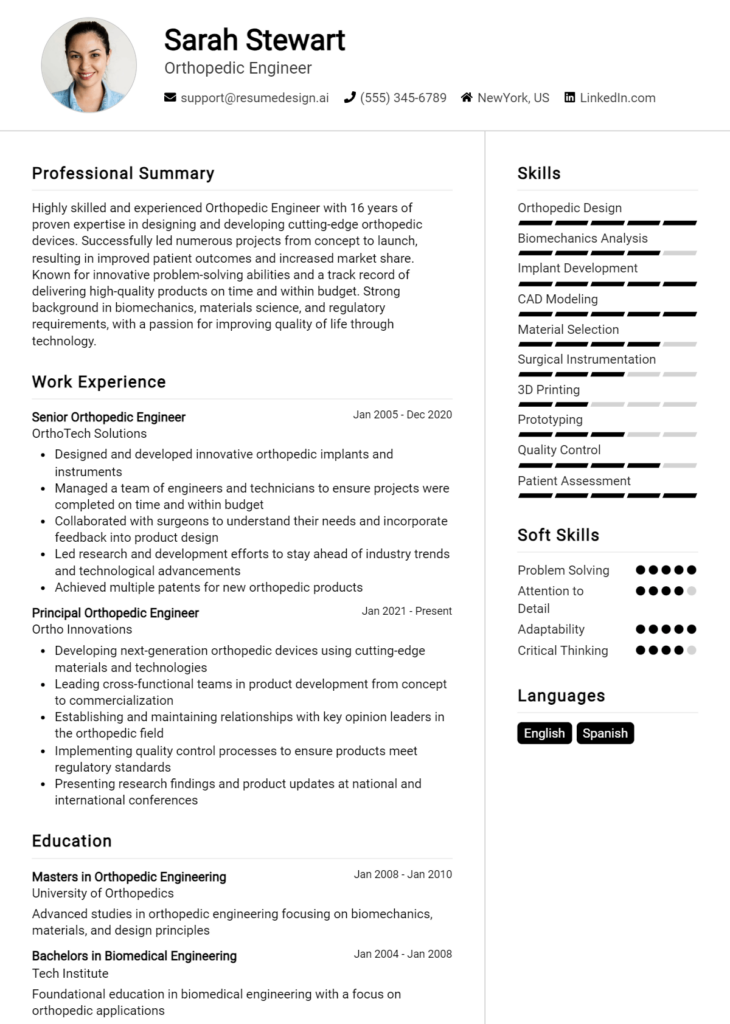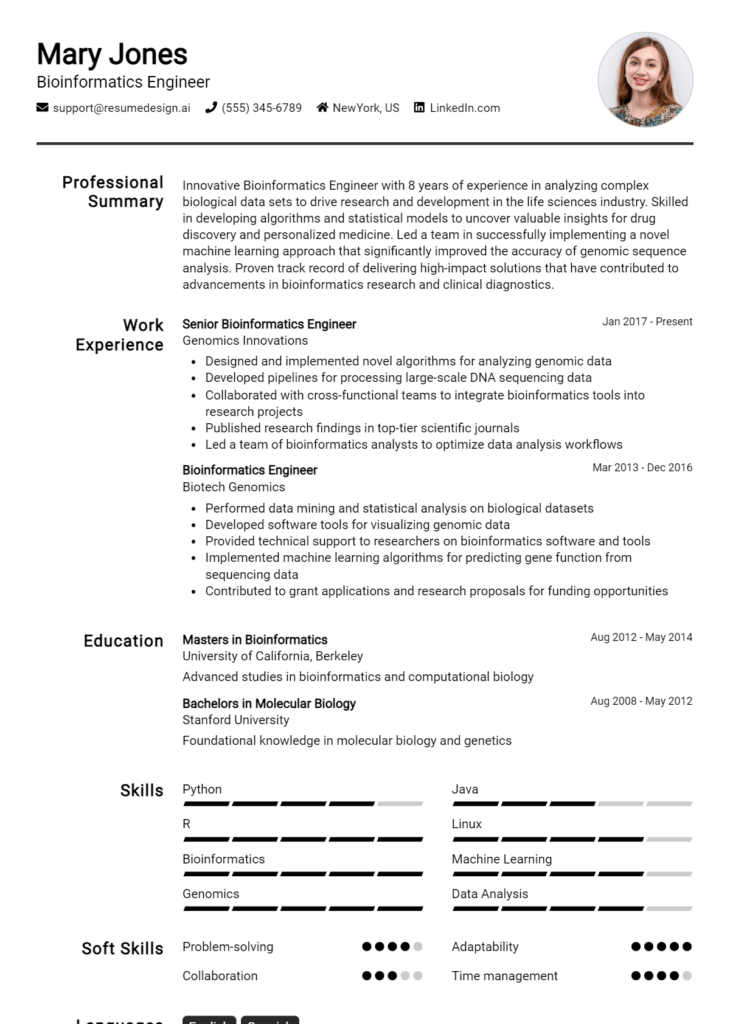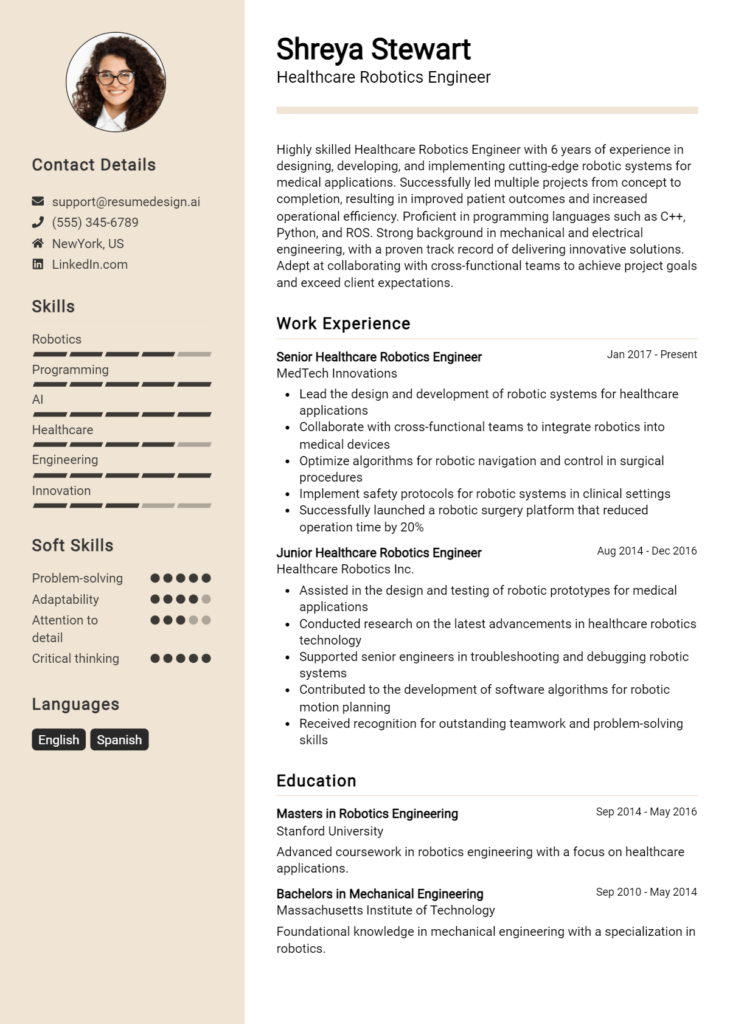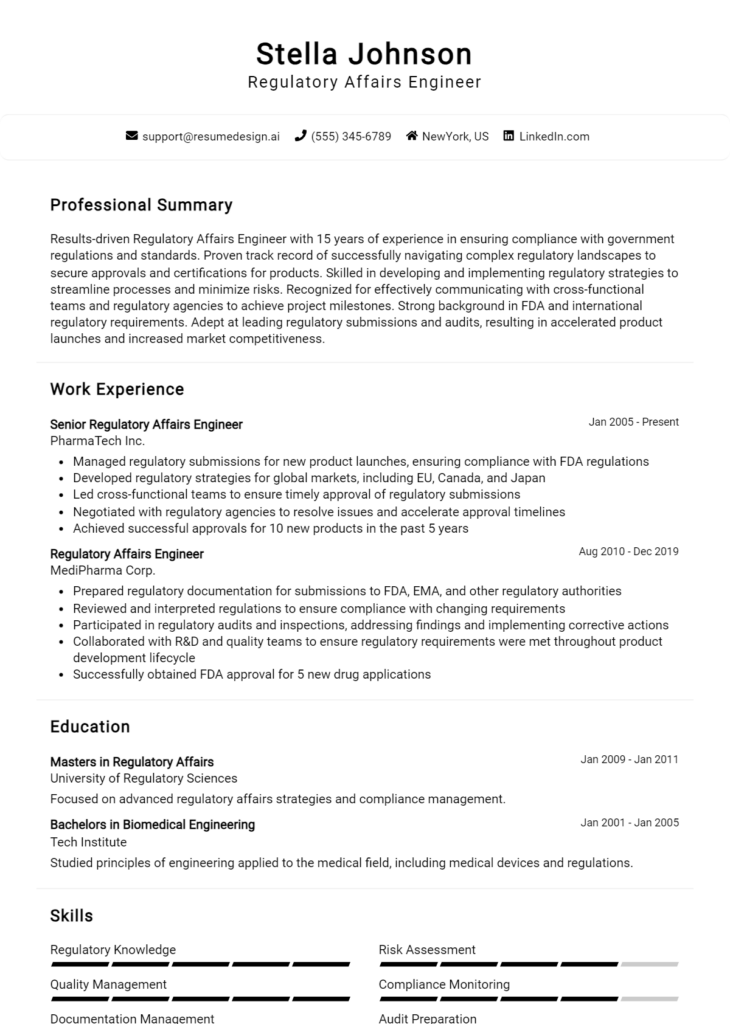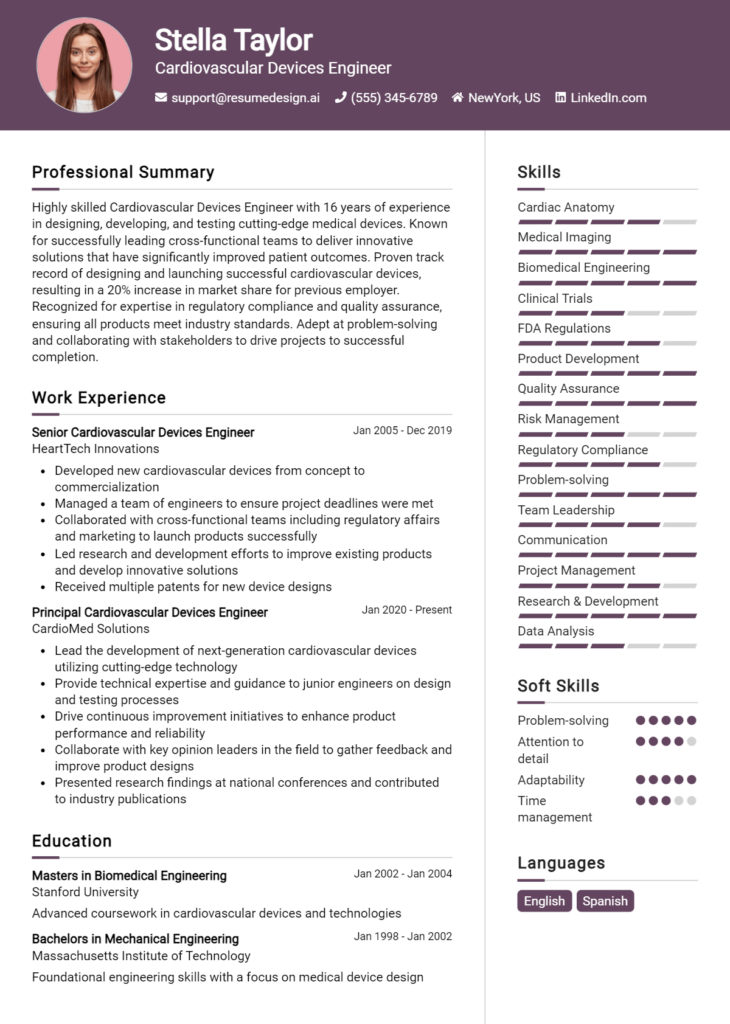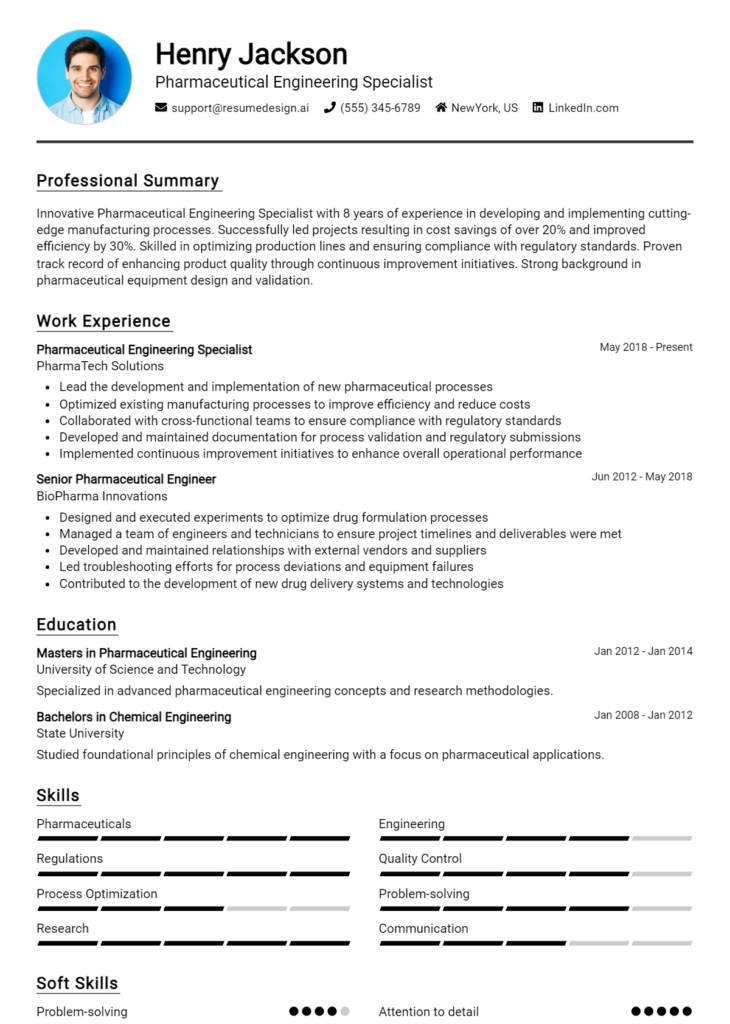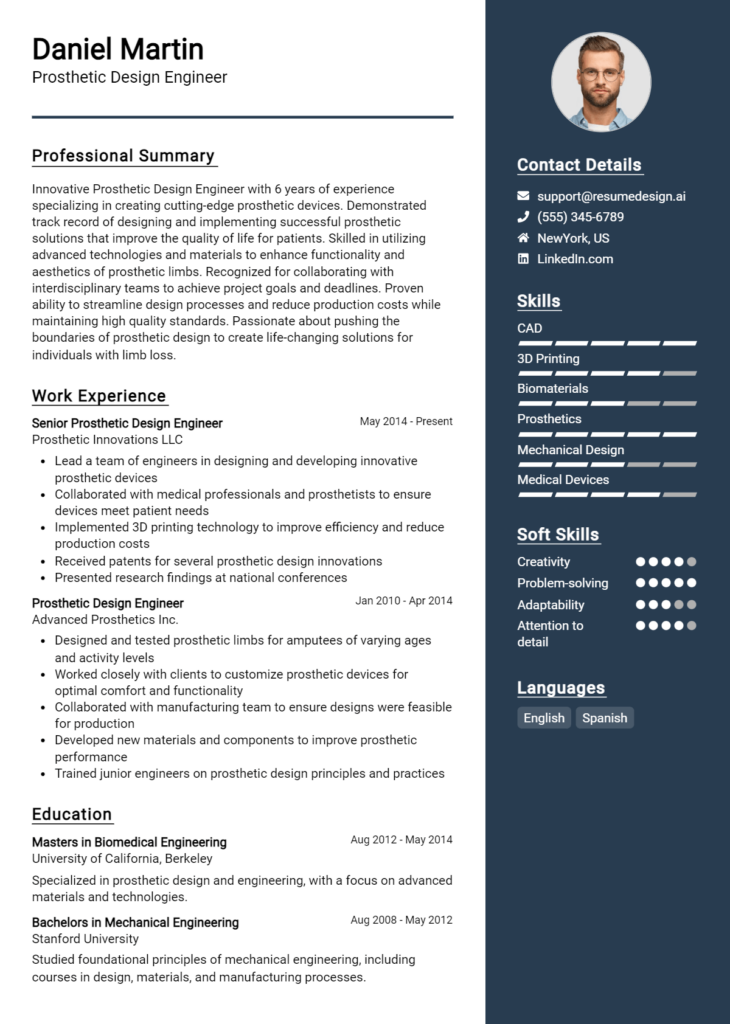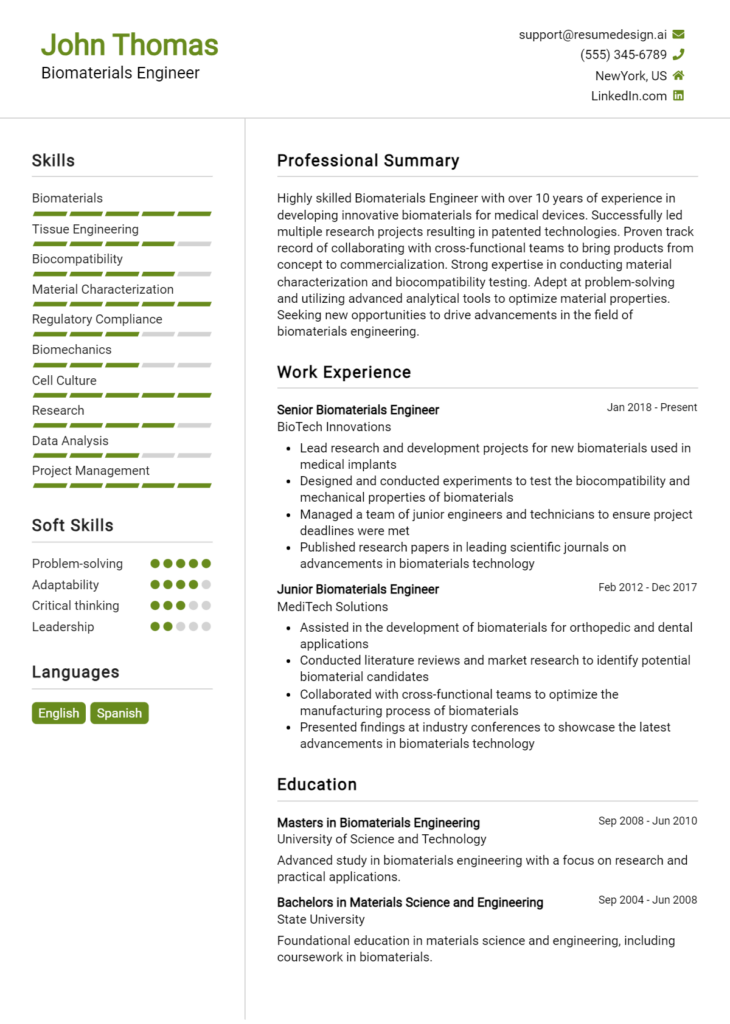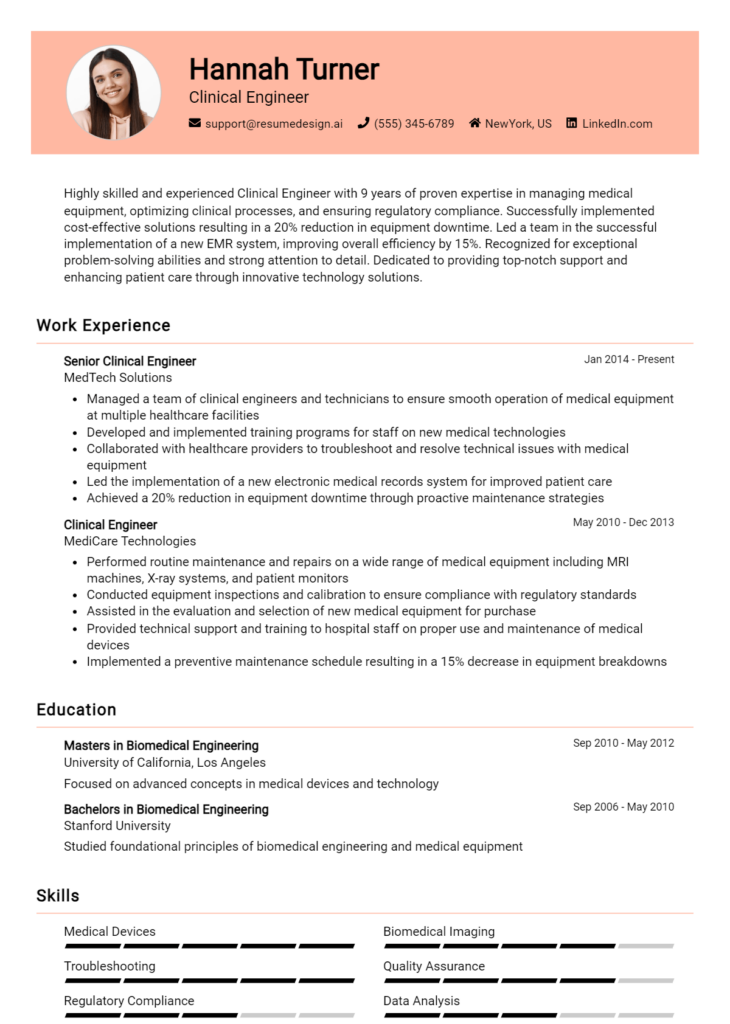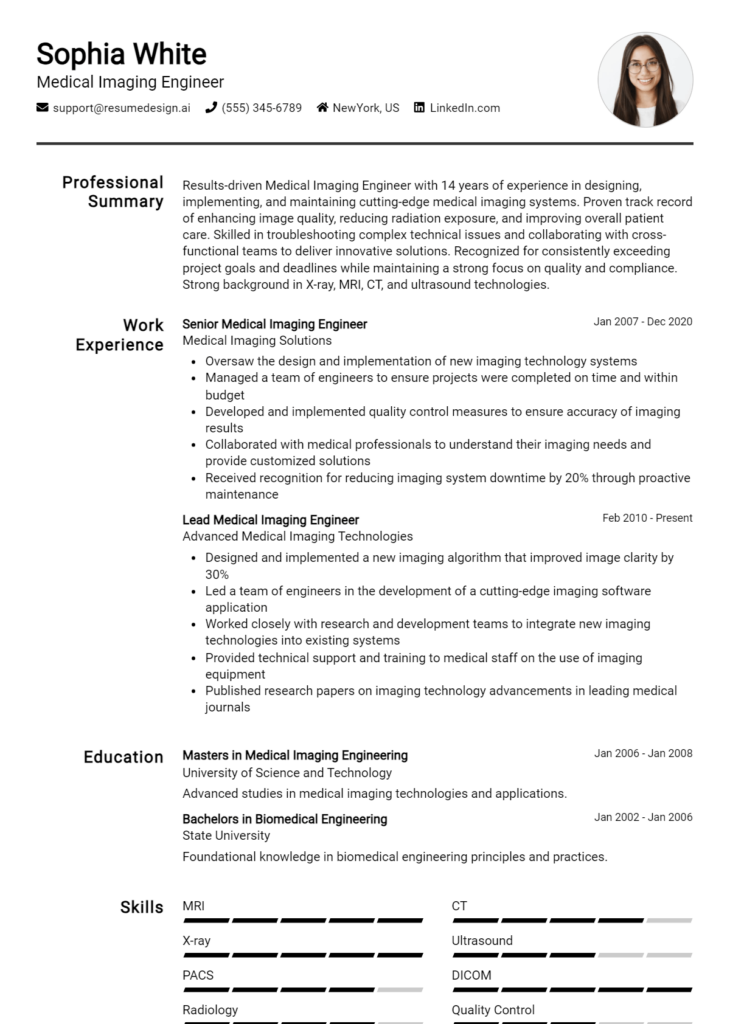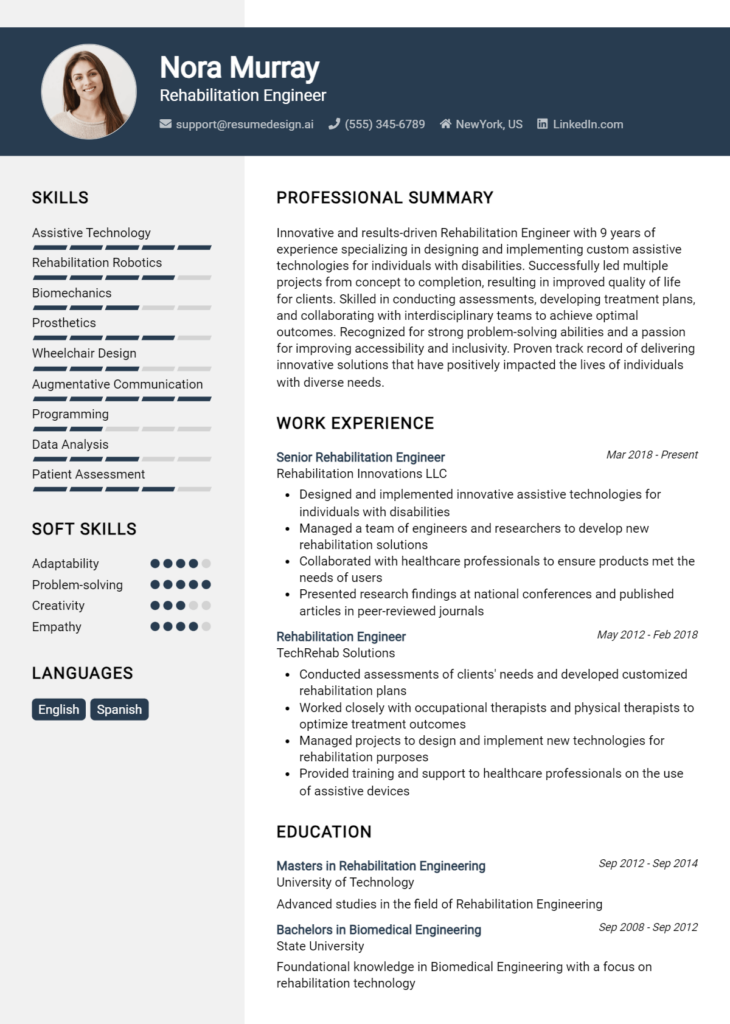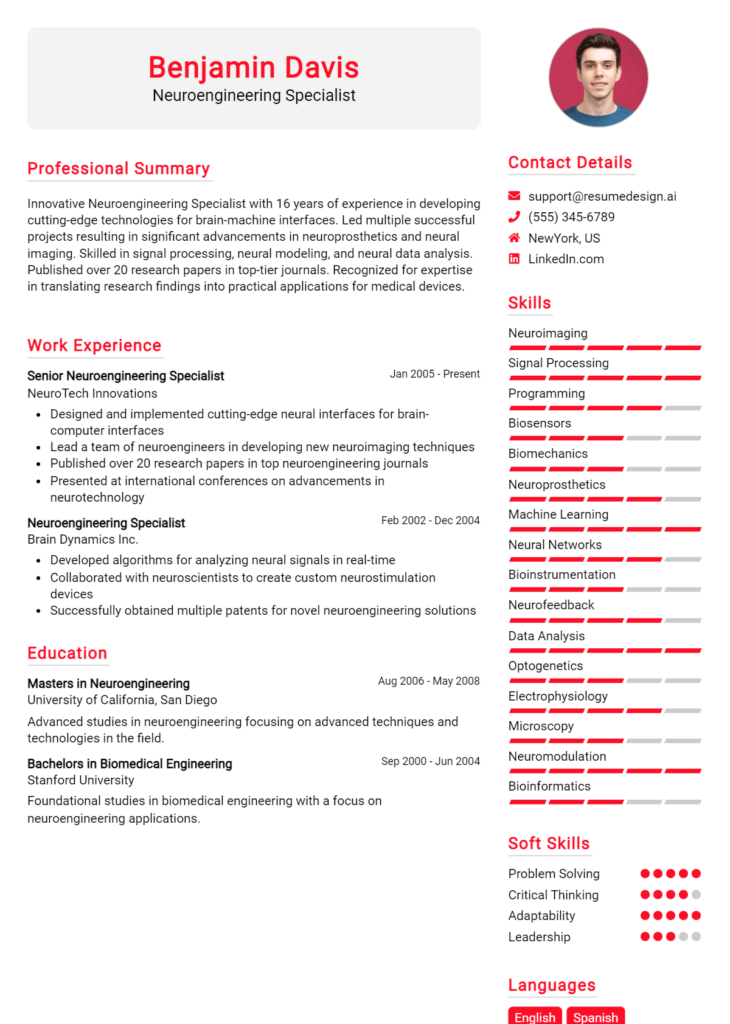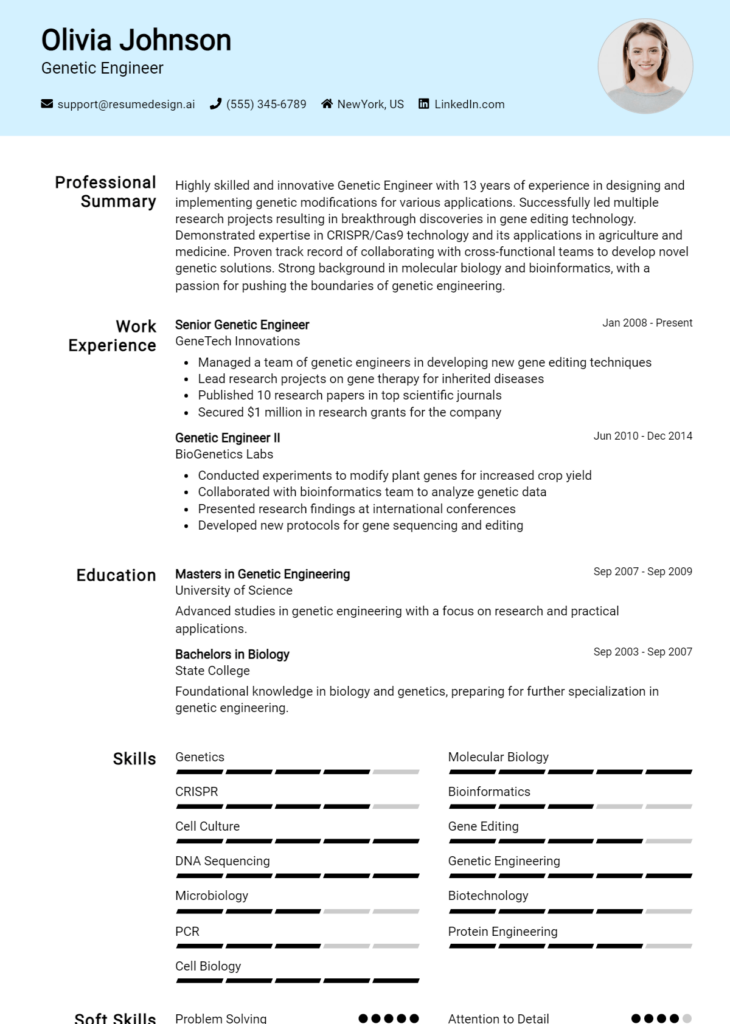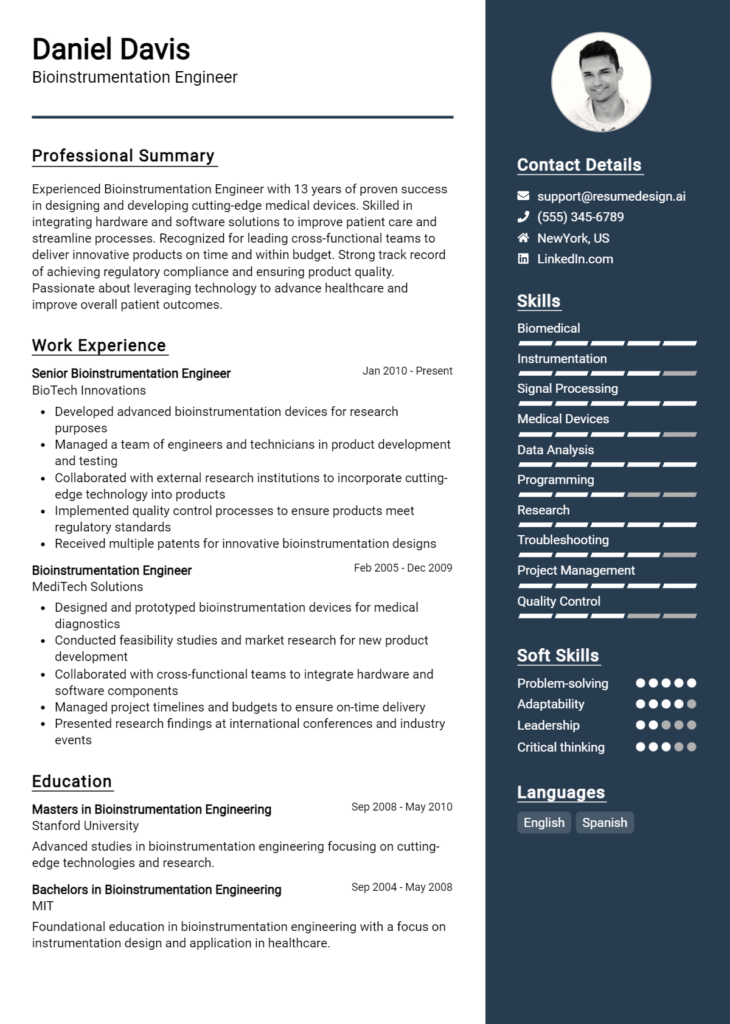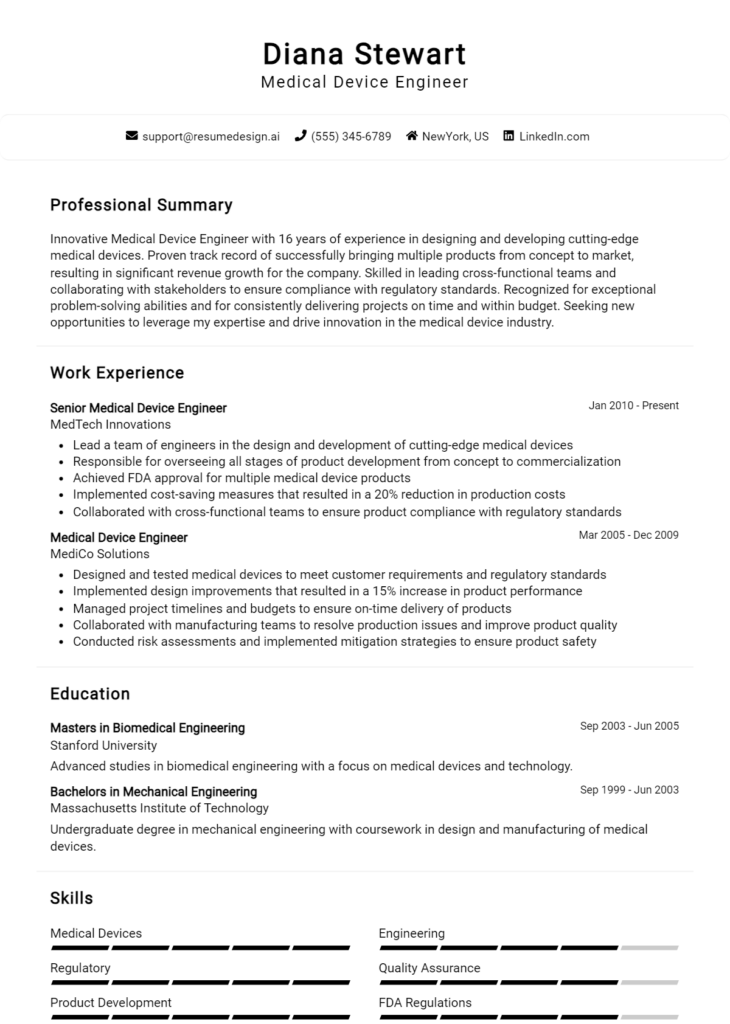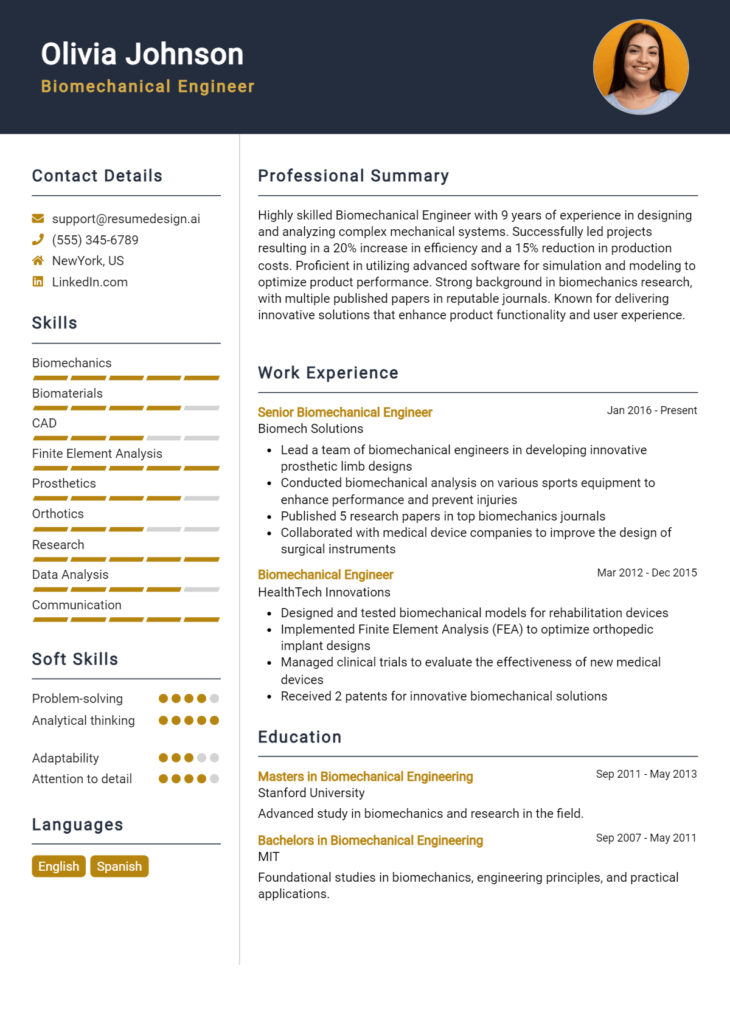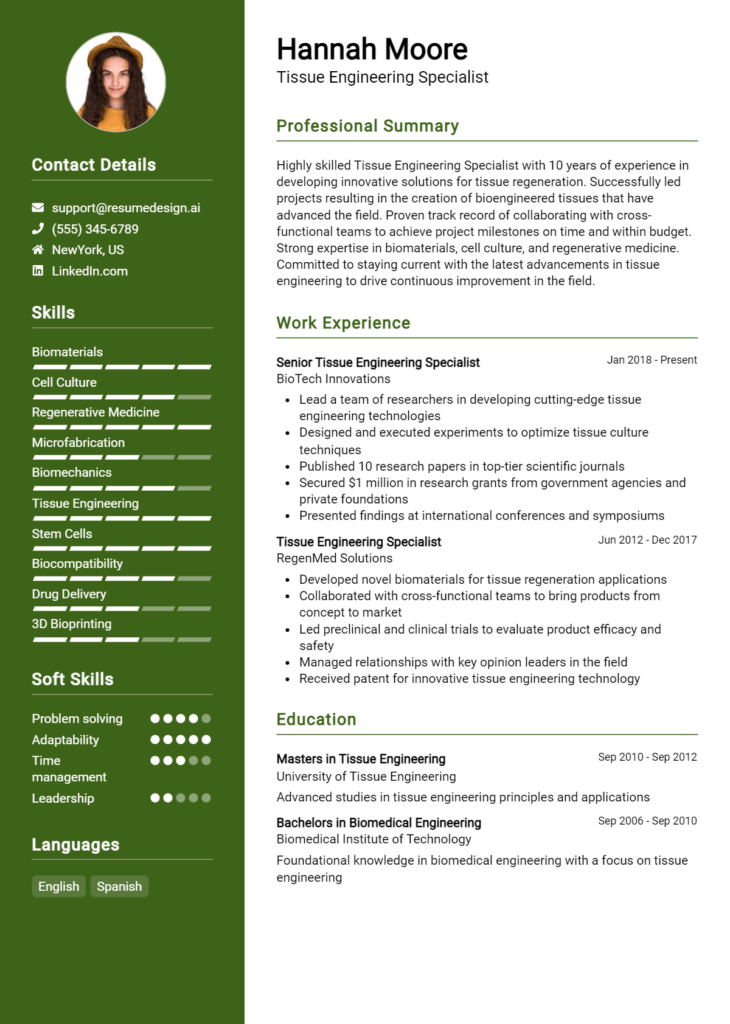Biomedical Engineer Core Responsibilities
A Biomedical Engineer plays a crucial role in the healthcare industry, integrating principles of engineering, biology, and medicine to develop and improve medical devices and technologies. Key responsibilities include designing and testing equipment, ensuring regulatory compliance, and collaborating with clinicians to understand their needs. Essential skills encompass technical proficiency, operational insight, and robust problem-solving abilities. These skills contribute significantly to organizational goals, enhancing patient care and safety. A well-structured resume can effectively highlight these qualifications, showcasing a candidate's potential impact.
Common Responsibilities Listed on Biomedical Engineer Resume
- Design and develop biomedical devices and equipment.
- Conduct research to improve existing medical technologies.
- Collaborate with healthcare professionals to assess device functionality.
- Ensure compliance with safety regulations and standards.
- Perform quality control and testing on medical products.
- Provide technical support and training to users of medical equipment.
- Analyze data and generate reports on device performance.
- Participate in cross-functional teams for product development.
- Stay updated on advancements in biomedical engineering technology.
- Develop and maintain documentation for engineering processes.
- Contribute to grant writing and funding proposals for research projects.
High-Level Resume Tips for Biomedical Engineer Professionals
A well-crafted resume is crucial for Biomedical Engineer professionals as it serves as the first impression a candidate makes on potential employers. In a competitive field that combines principles of engineering with biological sciences, it’s essential that your resume not only highlights your skills and technical knowledge but also showcases your accomplishments in a clear and compelling manner. Your resume is your marketing tool—an opportunity to demonstrate how your expertise aligns with the specific needs of the employer. This guide will offer practical and actionable resume tips tailored specifically for Biomedical Engineer professionals, helping you to stand out in this innovative industry.
Top Resume Tips for Biomedical Engineer Professionals
- Tailor your resume to match the specific job description, using keywords and phrases from the posting.
- Highlight relevant experience, including internships, projects, and research that align with the job requirements.
- Quantify your achievements by using metrics (e.g., improved efficiency by 20%, reduced costs by $10,000) to demonstrate impact.
- Showcase industry-specific skills such as proficiency in CAD software, knowledge of regulatory standards, and familiarity with medical devices.
- Emphasize your educational background, particularly any specialized training or certifications related to biomedical engineering.
- Include a section for technical skills, listing both software and engineering tools relevant to the biomedical field.
- Utilize a clean and professional layout to enhance readability and ensure important information stands out.
- Incorporate a brief summary statement at the top that encapsulates your career goals and key qualifications.
- Keep your resume concise, ideally one page, focusing on the most relevant and impactful information.
- Proofread for errors and ensure that your resume is free from typos and grammatical mistakes, as attention to detail is critical in engineering.
By implementing these resume tips, Biomedical Engineer professionals can significantly enhance their chances of landing a job in this dynamic field. A polished and targeted resume not only showcases your qualifications but also demonstrates your commitment to professionalism and your understanding of the industry's demands, setting you apart in a competitive job market.
Why Resume Headlines & Titles are Important for Biomedical Engineer
In the competitive field of biomedical engineering, a well-crafted resume headline or title serves as a vital first impression that can capture the attention of hiring managers. These headlines succinctly summarize a candidate's key qualifications and set the tone for the rest of the resume. A strong headline should be concise, relevant, and directly related to the specific job being applied for, allowing hiring managers to quickly understand the candidate's value proposition. By effectively conveying professional expertise and unique contributions in just a few words, a compelling resume headline can significantly enhance the likelihood of advancing to the next stage of the hiring process.
Best Practices for Crafting Resume Headlines for Biomedical Engineer
- Keep it concise: Aim for a headline that is no longer than 10-12 words.
- Be specific: Tailor your headline to the specific job title or area of expertise.
- Highlight key skills: Include essential skills or certifications that are relevant to the role.
- Showcase experience: Incorporate years of experience or notable achievements.
- Use industry keywords: Utilize terms that are commonly recognized in the biomedical engineering field.
- Focus on value: Emphasize how your skills contribute to the company’s goals or mission.
- Maintain professionalism: Ensure the tone is professional and reflects industry standards.
- Avoid jargon: Keep the language clear and accessible to a broad audience.
Example Resume Headlines for Biomedical Engineer
Strong Resume Headlines
Innovative Biomedical Engineer with 5+ Years in Medical Device Development
Results-Driven Engineer Specializing in Biomechanics and Tissue Engineering
Certified Biomedical Engineer with Expertise in Regulatory Compliance and Quality Assurance
Accomplished Biomedical Engineer Focused on Advancing Patient-Centric Technologies
Weak Resume Headlines
Engineer Looking for Opportunities
Experienced Professional
Seeking a Position in Engineering
Strong resume headlines are effective because they communicate specific skills, years of experience, and unique contributions relevant to the role, which instantly resonate with hiring managers. In contrast, weak headlines fail to impress because they are vague and non-specific, lacking the necessary detail to convey a candidate's qualifications or value. By avoiding generic phrases and instead focusing on role-specific attributes, candidates can significantly enhance their chances of standing out in the competitive job market for biomedical engineers.
Writing an Exceptional Biomedical Engineer Resume Summary
A well-crafted resume summary is a vital component for a Biomedical Engineer seeking to make a significant impression on potential employers. It serves as a brief introduction that quickly captures the attention of hiring managers by highlighting key skills, relevant experience, and notable accomplishments tailored to the specific job role. A strong summary should be concise and impactful, effectively setting the tone for the rest of the resume and encouraging further reading. By succinctly summarizing qualifications and expertise, candidates can differentiate themselves in a competitive job market.
Best Practices for Writing a Biomedical Engineer Resume Summary
- Quantify Achievements: Use specific numbers and metrics to demonstrate the impact of your work.
- Focus on Relevant Skills: Highlight technical and soft skills that align with the job description.
- Tailor for the Job: Customize your summary for each application to reflect the specific requirements of the role.
- Be Concise: Keep your summary brief—ideally, 3-5 sentences—while still covering essential points.
- Use Action Verbs: Start phrases with strong verbs to convey a sense of proactivity and ownership.
- Showcase Accomplishments: Include notable projects or achievements that demonstrate your expertise.
- Maintain Professional Tone: Use clear and professional language that reflects industry standards.
- Include Certifications: Mention relevant certifications or licenses to bolster credibility.
Example Biomedical Engineer Resume Summaries
Strong Resume Summaries
Biomedical Engineer with over 5 years of experience in designing and testing innovative medical devices, resulting in a 20% increase in patient safety metrics. Proven expertise in CAD software and regulatory compliance, with a successful track record of leading cross-functional teams on projects from conception to market launch.
Results-driven Biomedical Engineer with a Master's degree in Biomedical Engineering and 3 years of experience in developing advanced biomaterials. Spearheaded a project that reduced production costs by 15% while improving product quality, leading to a successful FDA approval.
Dynamic Biomedical Engineer skilled in data analysis and project management, noted for improving device efficiency by 30% through innovative redesigns. Experienced in collaborating with multidisciplinary teams to meet project deadlines and exceed performance expectations in a fast-paced environment.
Weak Resume Summaries
I am a Biomedical Engineer looking for a new opportunity. I have some experience in the field and various skills that could be useful.
Biomedical Engineer with a degree who has done some projects. I am a hard worker and am eager to learn more about the industry.
The strong resume summaries are considered effective because they include specific achievements and quantifiable results, directly showcasing the candidates' capabilities and relevance to the job role. They also employ professional language and demonstrate a clear understanding of the industry. In contrast, the weak summaries lack detail, specificity, and measurable outcomes, making them generic and less compelling to hiring managers.
Work Experience Section for Biomedical Engineer Resume
The work experience section of a Biomedical Engineer resume is crucial in demonstrating a candidate's technical prowess and practical application of engineering principles in the healthcare sector. This section not only showcases the candidate's ability to manage teams and lead projects but also highlights their commitment to delivering high-quality products that adhere to industry standards. By quantifying achievements and aligning experience with recognized benchmarks in the field, candidates can effectively illustrate their value to potential employers and set themselves apart in a competitive job market.
Best Practices for Biomedical Engineer Work Experience
- Highlight technical skills relevant to biomedical engineering, such as proficiency in CAD software or knowledge of regulatory standards.
- Quantify achievements with specific metrics, such as percentage improvements in product efficiency or cost reductions.
- Demonstrate leadership capabilities by detailing experiences in managing cross-functional teams or leading projects to successful completion.
- Align your experiences with industry standards and trends to showcase your awareness of the field.
- Use action verbs to convey your role in projects, emphasizing your contributions and impact.
- Include collaborative projects that illustrate your ability to work effectively with diverse teams, including clinicians and researchers.
- Tailor the work experience section to reflect the job description of the position you are applying for.
- Provide context for your roles, explaining the significance of projects and how they contributed to the organization's goals.
Example Work Experiences for Biomedical Engineer
Strong Experiences
- Led a team of 5 engineers in the development of a new cardiac monitoring device, resulting in a 25% increase in patient compliance and a 15% reduction in hospital readmission rates.
- Designed and implemented a quality control system that reduced manufacturing defects by 30%, significantly improving product reliability and customer satisfaction ratings.
- Collaborated with clinical staff to optimize the usability of an infusion pump, leading to a 40% decrease in user errors during training sessions.
- Managed a cross-disciplinary project that streamlined the regulatory approval process for a new orthopedic implant, achieving FDA approval 3 months ahead of schedule.
Weak Experiences
- Worked on various projects related to medical devices.
- Helped with some tasks in the engineering department.
- Participated in team meetings and contributed ideas.
- Involved in the development of biomedical products.
The strong experiences are considered effective because they provide specific outcomes and metrics that highlight the candidate's technical expertise and leadership capabilities. They demonstrate measurable impacts on projects and showcase collaboration with other professionals. In contrast, the weak experiences lack detail, specificity, and quantifiable results, making it difficult for potential employers to assess the candidate's contributions and effectiveness in previous roles.
Education and Certifications Section for Biomedical Engineer Resume
The education and certifications section of a Biomedical Engineer resume is crucial as it provides prospective employers with a clear overview of the candidate's academic qualifications and commitment to the field. This section not only highlights the candidate's formal education, such as degrees in biomedical engineering or related fields, but also showcases any industry-relevant certifications that enhance their professional profile. By including relevant coursework, certifications, and specialized training, candidates can demonstrate their continuous learning efforts and adaptability to new technologies and methodologies, significantly enhancing their credibility and alignment with the demands of the job role.
Best Practices for Biomedical Engineer Education and Certifications
- Include your highest degree first, followed by relevant certifications and training.
- Be specific about your degree, mentioning your major and any minors or specializations.
- Highlight industry-recognized certifications, such as Certified Biomedical Equipment Technician (CBET) or Clinical Engineer (CCE).
- List relevant coursework that aligns with the job requirements to showcase specialized knowledge.
- Include the name of the institution and the dates of attendance for each degree or certification.
- Consider including continuing education courses or workshops that demonstrate ongoing professional development.
- Avoid including irrelevant degrees or certifications that do not pertain to the biomedical engineering field.
- Keep the format consistent, ensuring clarity and readability for potential employers.
Example Education and Certifications for Biomedical Engineer
Strong Examples
- Bachelor of Science in Biomedical Engineering, University of California, Los Angeles (UCLA), 2020
- Certified Biomedical Equipment Technician (CBET), 2021
- Relevant Coursework: Biomechanics, Medical Device Design, Biomaterials
- Master’s Degree in Biomedical Engineering, Johns Hopkins University, Expected 2023
Weak Examples
- Associate Degree in General Studies, Community College, 2018
- Certification in Web Development, 2020
- Relevant Coursework: Introduction to Psychology, Art History
- Diploma in Electrical Engineering, 2005 (outdated)
The strong examples are considered effective because they directly relate to the biomedical engineering field, showcasing relevant degrees, certifications, and coursework that align with industry requirements. In contrast, the weak examples fall short as they include irrelevant qualifications, outdated certifications, and coursework that does not pertain to the biomedical engineering discipline, ultimately failing to present the candidate as a suitable fit for the role.
Top Skills & Keywords for Biomedical Engineer Resume
In the competitive field of biomedical engineering, showcasing the right skills on your resume is crucial for capturing the attention of potential employers. A well-crafted resume that highlights both hard and soft skills not only demonstrates your technical expertise but also reflects your ability to work collaboratively in multidisciplinary teams, think critically, and adapt to rapidly changing environments. By focusing on these essential skills, you can effectively communicate your qualifications and stand out in a pool of candidates. To enhance your resume, consider integrating relevant skills that align with the requirements of the job you are applying for.
Top Hard & Soft Skills for Biomedical Engineer
Soft Skills
- Communication
- Teamwork and Collaboration
- Problem-Solving
- Critical Thinking
- Time Management
- Adaptability
- Attention to Detail
- Creativity
- Leadership
- Ethical Judgment
Hard Skills
- Medical Device Design
- Biomechanics
- Computer-Aided Design (CAD)
- Regulatory Compliance (FDA, ISO)
- Signal Processing
- Biomaterials
- Programming Languages (e.g., Python, MATLAB)
- Data Analysis and Statistics
- Imaging Techniques (MRI, CT scans)
- Quality Assurance and Control
Highlighting a balanced mix of these hard skills and soft skills on your resume can significantly enhance your appeal as a qualified biomedical engineer, ensuring that you make a strong impression on hiring managers.
Stand Out with a Winning Biomedical Engineer Cover Letter
Dear Hiring Manager,
I am writing to express my interest in the Biomedical Engineer position at [Company Name] as advertised on [Job Board/Company Website]. With a Master’s degree in Biomedical Engineering from [University Name] and over [X years] of hands-on experience in developing innovative medical devices and technologies, I am excited about the opportunity to contribute to your team. My background in both engineering principles and biological sciences equips me with the unique skills necessary to bridge the gap between technology and healthcare.
During my previous role at [Previous Company Name], I successfully led a team in the design and implementation of a novel prosthetic limb that improved mobility for patients with limb loss. This project not only enhanced my technical skills—such as CAD design and materials selection—but also honed my project management and collaboration abilities. Working closely with healthcare professionals and patients, I gained valuable insights into user-centered design, ensuring that our solutions were not only functional but also met the real-world needs of users.
I am particularly drawn to [Company Name] because of your commitment to advancing healthcare through innovative technology. I am impressed by your recent work on [Specific Project or Technology], and I am eager to contribute my expertise in regulatory compliance and quality assurance processes to further enhance your product development. I am confident that my passion for improving patient outcomes, combined with my technical knowledge and collaborative spirit, would make me a strong asset to your team.
Thank you for considering my application. I look forward to the opportunity to discuss how my skills and experiences align with the goals of [Company Name]. I am excited about the possibility of contributing to your innovative projects and am eager to bring my expertise in biomedical engineering to your esteemed organization.
Sincerely,
[Your Name]
[Your Phone Number]
[Your Email Address]
Common Mistakes to Avoid in a Biomedical Engineer Resume
When crafting a resume as a Biomedical Engineer, it's crucial to present your skills and experiences in a clear and professional manner. However, many candidates make common mistakes that can hinder their chances of landing an interview. Avoiding these pitfalls can enhance the effectiveness of your resume and help you stand out in a competitive job market. Here are some common mistakes to watch out for:
Generic Objective Statements: Using a vague or generic objective statement can make your resume blend in with others. Tailor your objective to reflect your specific career goals and how they align with the job you're applying for.
Neglecting Technical Skills: In the field of biomedical engineering, technical skills are paramount. Failing to list relevant software, programming languages, or engineering tools can leave out critical information that employers look for.
Overloading with Jargon: While technical terminology is important, using too much jargon can confuse hiring managers. Aim for a balance that showcases your expertise without alienating readers who may not be familiar with all the terms.
Ignoring Quantifiable Achievements: Simply listing job responsibilities can make your resume feel flat. Instead, focus on quantifiable achievements, such as projects completed, improvements made, or efficiencies gained, to demonstrate your impact.
Inconsistent Formatting: A disorganized or inconsistent format can make your resume difficult to read. Ensure that your layout is clean and consistent, using the same font, size, and style throughout.
Lack of Relevant Experience: Including unrelated work experience can dilute the focus of your resume. Instead, prioritize experiences that showcase your biomedical engineering skills and contributions to the field.
Omitting Continuing Education: The biomedical field is constantly evolving. Failing to include recent certifications, workshops, or courses can suggest a lack of commitment to professional development.
Typos and Grammatical Errors: Simple mistakes can undermine your professionalism. Always proofread your resume multiple times and consider having someone else review it to catch any errors.
Conclusion
As we explored the dynamic role of a Biomedical Engineer, we highlighted the essential skills, educational background, and real-world applications that define this profession. Biomedical Engineers are at the forefront of innovation, bridging the gap between medicine and technology to improve patient care and healthcare systems. We discussed the importance of staying updated with industry advancements and the necessity of showcasing your unique qualifications in a well-structured resume.
In today’s competitive job market, having a polished and professional resume is crucial for standing out to potential employers. We encourage you to take the time to review and refine your Biomedical Engineer resume, ensuring that it effectively represents your skills, experiences, and achievements.
To assist you in this process, consider utilizing the following resources:
- Explore a variety of resume templates that cater specifically to the Biomedical Engineering field.
- Use the resume builder to create a customized resume tailored to your qualifications.
- Review resume examples that can inspire and guide you in crafting your own.
- Don't forget to complement your resume with a strong application by utilizing our cover letter templates.
Take action today to enhance your professional profile and increase your chances of landing your dream job as a Biomedical Engineer!

